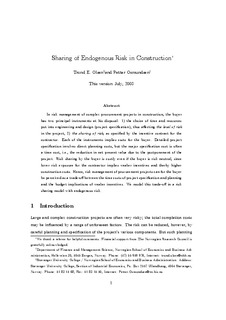| dc.description.abstract | In risk management of complex procurement projects in construction, the buyer has two principal instruments at his disposal: 1) the choice of time and resources put into engineering and design (project specification), thus affecting the level of risk in the project, 2) the sharing of risk, as specified by the incentive contract for the contractor. Each of the instruments implies costs for the buyer. Detailed project specification involves direct planning costs, but the major specification cost is often a time cost, i.e., the reduction in net present value due to the postponement of the project. Risk sharing by the buyer is costly even if the buyer is risk neutral, since lower risk exposure for the contractor implies weaker incentives and thereby higher construction costs. Hence, risk management of procurement projects can for the buyer be perceived as a trade-off between the time costs of project specification and planning and the budget implications of weaker incentives. We model this trade-off in a risk sharing model with endogenous risk. | en |
